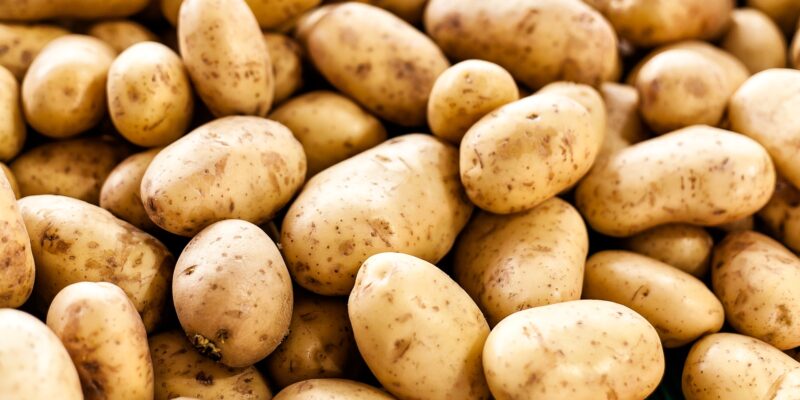Potatoes have long been a staple in diets around the world, known primarily for their carbohydrate content. However, to focus solely on their carbs is to overlook a wealth of nutritional benefits that make potatoes a valuable addition to any diet. This article explores the potato nutrition facts, revealing why they deserve more appreciation in our daily meals.
A Nutritional Overview
Potatoes are often dismissed as simple starchy vegetables, but they are much more than that. A medium-sized potato (about 150 grams) provides approximately 110 calories, making it a low-calorie food option. What sets potatoes apart is their rich nutrient profile, which includes vitamins, minerals, fiber, and antioxidants.
Carbohydrates: More Than Just Energy
It’s true that potatoes are rich in carbohydrates, with about 26 grams per medium potato. These carbs are a vital source of energy. Importantly, potatoes contain resistant starch, a type of carbohydrate that acts like fiber. Over time, resistant starch makes its way to the colon, where it is consumed by good gut flora after going undigested through the stomach and small intestine. This procedure can strengthen sensations of fullness and enhance gut health, both of which support healthy weight management.
Fiber: Essential For Digestive Health
A good source of dietary fiber is potatoes, particularly when eaten raw. Approximately 2 grams of fiber, which is necessary to keep the digestive tract in good condition, can be found in a medium-sized skin-on potato. In addition to preventing constipation and helping to regulate bowel motions, fiber may also reduce the chance of developing digestive diseases like diverticulitis. Additionally, fiber can aid in controlling blood sugar levels and reducing cholesterol.
Vitamins: More Than Just Vitamin C
A great source of several vitamins is potatoes. They are particularly high in vitamin C, with a medium potato providing about 30% of the recommended daily intake. Strong antioxidants like vitamin C strengthen the immune system, support good skin health, and facilitate the body’s ability to absorb iron from previous meals.
Potatoes also contain significant amounts of B vitamins, including B6 and folate. Vitamin B6 is crucial for brain health, helping to create neurotransmitters that regulate mood and mental function. Folate, or vitamin B9, is a necessary component of cell division and is especially crucial during times of rapid growth, including pregnancy and infancy.
Minerals: Building Strong Bodies
Iron, magnesium, potassium, and other vital elements are all found in good amounts in potatoes. Potassium is necessary to maintain blood pressure levels within a safe range. A medium potato provides around 620 milligrams of potassium, or 14% of the daily required consumption, which is more than twice as much as a banana. Potassium promotes muscular function, cardiovascular health, and the body’s ability to balance fluids and electrolytes.
Potatoes include magnesium, which helps the body perform several biochemical processes, such as the synthesis of proteins, the production of energy, and the function of muscles and nerves. Iron is necessary for the synthesis of hemoglobin, the protein present in red blood cells that carries oxygen throughout the body, even though it is found in smaller amounts.
Antioxidants: Fighting Free Radicals
Antioxidants, found in abundance in potatoes, shield the body from harm caused by dangerous chemicals known as free radicals. These antioxidants include compounds like flavonoids, carotenoids, and phenolic acids. Research has indicated that the antioxidants present in potatoes have the potential to mitigate inflammation and decrease the likelihood of chronic illnesses, including cancer and heart disease.
The type and amount of antioxidants can vary depending on the potato variety and its color. For example, red and purple potatoes contain higher levels of anthocyanins, which have been linked to reduced cancer risk and improved heart health.
Practical Tips For Maximizing Nutritional Benefits
To get the most nutritional benefit from potatoes, consider the following tips:
- Eat The Skin: Much of the fiber and many nutrients are found in the potato skin. Whenever possible, consume potatoes with their skin on.
- Choose Cooking Methods Wisely: Baking, boiling, and steaming are healthier cooking methods that retain more nutrients compared to frying.
- Pair With Healthy Ingredients: Don’t overdo the high-fat toppings on potatoes, such as sour cream and butter. Choose healthy substitutes instead, such as Greek yogurt, spices, and herbs.
Conclusion
Potatoes are much more than just a carbohydrate source; they are a nutrient-dense food that provides a range of health benefits. Potatoes provide a lot of nutrients that can contribute to a balanced and healthful diet, including vitamins, minerals, fiber, and antioxidants. By looking beyond the carb count, we can appreciate the full nutritional value of potatoes and enjoy them as part of our regular meals.

Comments